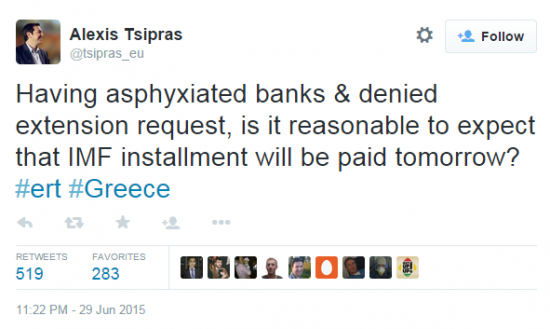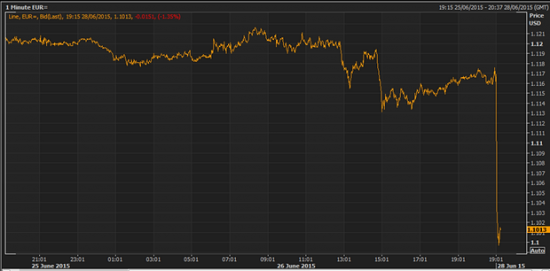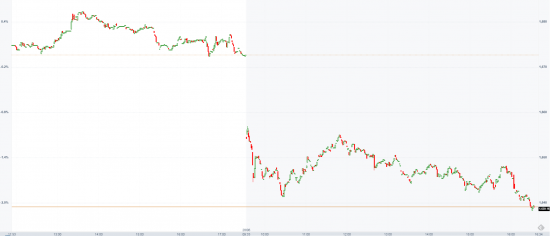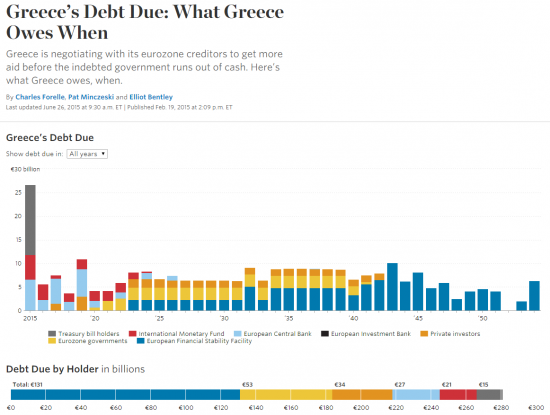Θ_Hunter
30.06.2015: Повестка Дня
- 30 июня 2015, 01:49
- |

Литературный перевод:
«После того, как *Они* задушили наши банки и отклонили нашу просьбу о переносе выплат,
неужели у МВФ ещё теплится надежда касательно завтрашнего платежа???»
Официальным «дедлайном» для завтрашних выплат, является 23:00 по Лондону(01:00 по Москве 1-го июля)
Но завтра, по идее, ничего страшного не должно быть, так как «Они» закрывают и квартал, и пол-года.
"Window Dressing" называется...
S&P оценивает выход Греции из Еврозоны, как 50%...
Агентство также вырaзило мнение, что если в Греции не произойдёт немедленных реформ, требуемых Еврогруппой,
то «коммерческое» банкротство неизбежно произойдёт в течение ближайших 6-ти месяцев...
- комментировать
- Комментарии ( 4 )
Отчего тарят Йену в USD/JPY?
- 29 июня 2015, 00:51
- |
USD/CHF: +0.91%...
USD/JPY: -1.07%...
Бакс через Йену падает более чем на 1% в моменте...
Это выход из carry trade?
"Чёрная Среда" /1997/
- 28 июня 2015, 23:19
- |
Пока Азия будет просыпаться, предлагаю засмотреть документальный фильмец о крахе Британского Фунта в 1992 году.
Скучно, но зато познавательно :)
Если что, это рекомендация к завтрашним открытиям от «самого» ZeroHedge :))
Последние греческие слухи
- 28 июня 2015, 22:15
- |
Дневной лимит снятия наличных установлен в размере 60 евро/сутки, всю следующую неделю.
Банки будут открыты только спустя 2 дня после референдумa,
т.е. 7-го июля...
Евро упал на открытии

( Читать дальше )
Инфографика греческого долга
- 28 июня 2015, 21:28
- |
По ссылке(http://graphics.wsj.com/greece-debt-timeline/) находится любопытная таблица, в которой весь греческий долг, аккумулированный до сегодняшнего дня, расписан по конкретным датам...
Последняя долговая «запись» — значится 28 апреля 2054 года :)
P.S.
Не всё так страшно выглядит :), ибо новые греческие облигации можно будет разместить после 2015 года(судя по графику),
и впарить их новым инвесторам-спекулянтам :)
Завтрашние новости -- сегодня :)
- 28 июня 2015, 20:27
- |
Сегодня, тель-авивские smart-money, отыграли «завтрашние» новости таким образом:

Гэп на открытии, закрытие — ниже пятницы на -1.78%...
Последнее Сиртаки в Брюсселе :)
- 28 июня 2015, 20:19
- |
Есть ещё десяток классных финансовых блогов, оперативно освещающих подобные события.
Один из них, классическо-фундаментальный, — "FT Alphaville",-- просто musthave...
В Merill Lynch подводят итоги 2014 года
- 08 декабря 2014, 19:36
- |
Surprise #1: Bond yields fell
Surprise #2: Where’s the volatility?
Surprise #3: The BoJ opts for further easing
Surprise #4: Oil prices plunge
Surprise #5: Defensive sectors outperform cyclicals
В документе можно ознакомиться со стратегическими тезисами текущего инвестиционного портфеля Merill Lynch,
а также прочитать бриф-интервью начальника инвестотдела ML с Jeffry Gundlach.
PDF >>>
"Energy 2020: Out of America" -- опубликовано в Citi
- 07 ноября 2014, 04:00
- |
Вот ссылка на ПДФ-файл: >>>>
теги блога Θ_Hunter
- 2014 год
- bitcoin exchange
- Bitcoin криптовалюта майнинг
- blockchain
- brokerage
- Buffett
- carry trade
- Cryptocoins
- eth
- ethereum
- Fitch Rating
- Forbes.ru
- macro
- mining
- Monero
- outlook
- portfolio managment
- S&P500
- аналитика
- биржи криптовалют
- биткоин
- блоги
- британский фунт
- Греция кризис
- Греческие банки
- греческий вопрос
- греческий долг
- греческий кризис
- документальное кино
- долгосрочное инвестирование
- Доходность портфеля
- Еврозона борьба с кризисом
- Еврозона кризис
- исследование рынка
- Китайская биржа
- китайские акции
- Книги
- корреляция
- Крах
- кризис
- криптовалюта
- криптовалюта новости
- криптовалюты новости
- криптономика
- крипторынок
- майнинг криптовалют
- оффтоп
- поводыри
- портфель большие деньги
- прогноз
- регуляция
- сша
- чтиво
- энергетический сектор























